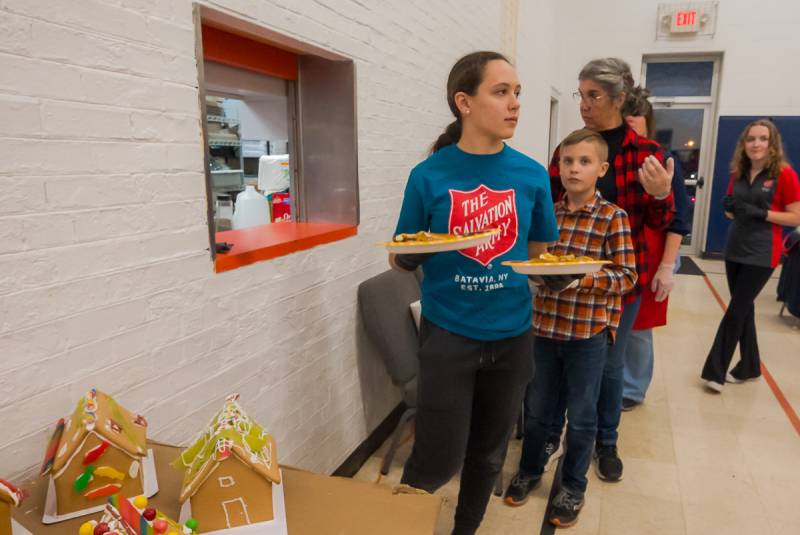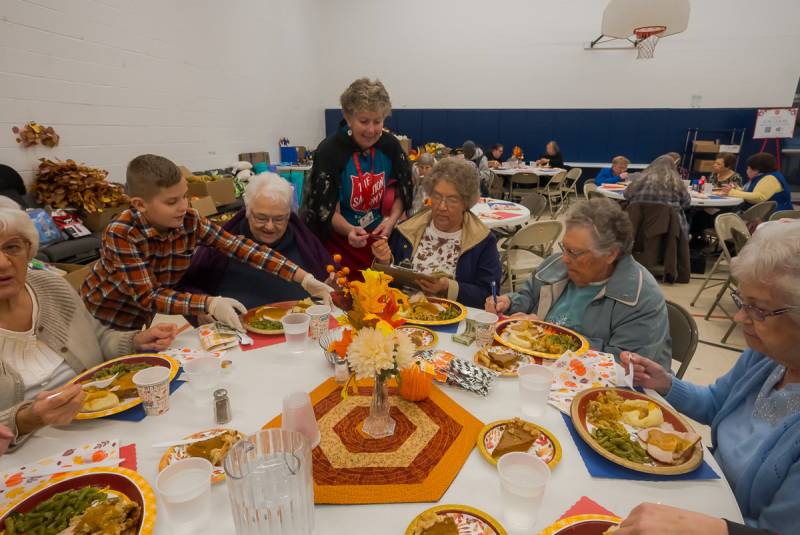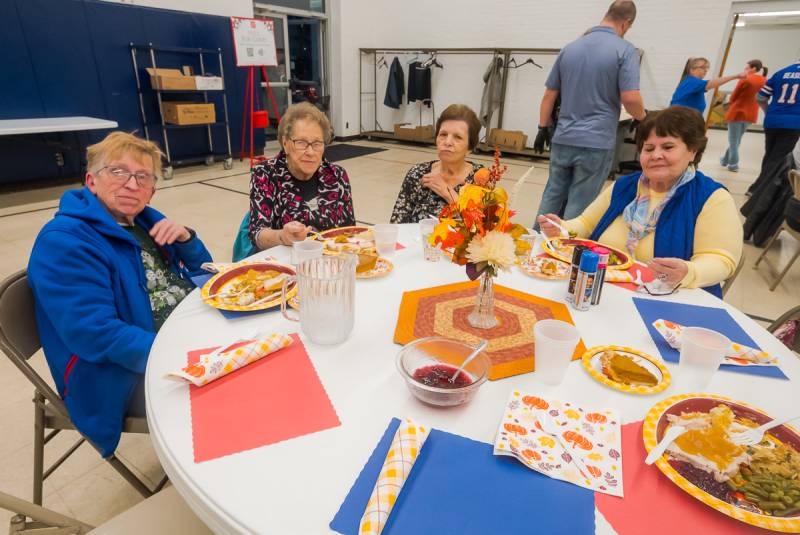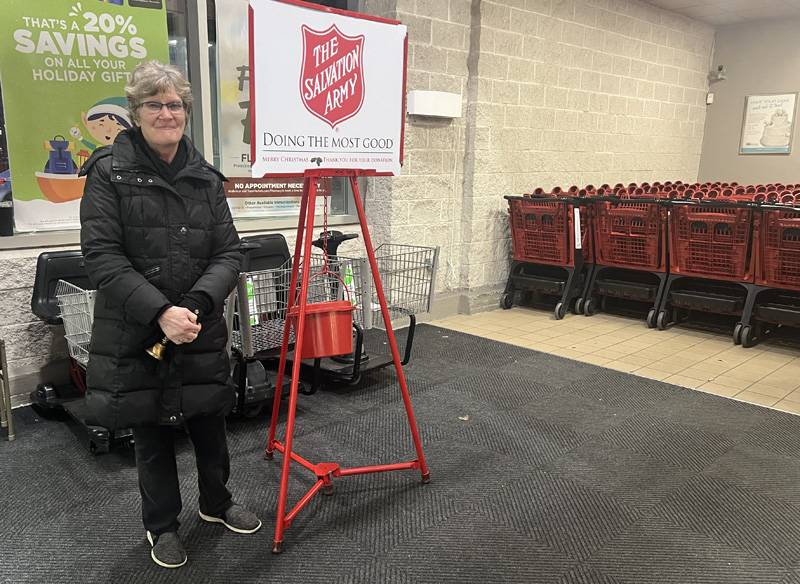
Photo by Howard Owens.
When you walk near a red Salvation Army kettle outside a local store and hear the ting-a-ling of a volunteer's silver bell, Capt. Bradley Moore thinks, perhaps, the notes you hear is a reminder of hope.
Hope for the families who will be fed or clothed by your donation, hope for those who don't know where else to turn during the Christmas season, and a hope that helps you remember there are people in your community who depend on the Salvation Army and your support of its ministry.
The Salvation Army has been in Genesee County for 138 years, helping spread hope to those in need 365 days a year. The volunteer -- or seasonal worker -- ringing the bell is often most visible reminder of the Salvation Army but Army serves the community's poor and those in crisis everyday.
The Red Kettle Campaign is a big reason the Salvation Army can meet the needs of your friends, family members, and neighbors in Genesee County.
This year, the fundraising goal is a big one -- $100,000.
"We served over 11,000 people food in the last year," said Moore, who, along with his wife Rachel, manages the Salvation Army in Batavia. "So, as you hear that bell, know that it's helping all year round. It is just a reminder that the Salvation Army is a source of hope for a lot of people. As you see the shield and hear the bells, know that raising that money is essential for us to be able to continue the good work."
The services available at the Salvation Army at 529 E. Main St., Batavia, include a food pantry and clothing, as well as community meals, Friday family nights, and Sunday church services, but the staff at the Salvation Army are committed to finding assistance for anybody who comes in with an unmet need.
"If somebody comes to us with a need, we'll do whatever we can to either meet that need here or partner with somebody to help meet that need," Moore said. "Obviously, food is huge right now. Our food pantry serves roughly 35 to 45 families every day that we're open, which is Monday, Wednesday, and Friday. We partner a lot with neighborhood legal services if somebody's having issues with landlords. For domestic violence, we help through the YWCA. We do whatever we can for whoever walks in the door."
Moore said the Salvation Army's operations manager, Tood Rapp, is particularly adept at discovering the needs of people who drop in and assuring them the Salvation Army can, in fact, help.
"I often say, I gotta get him a mug or something that says, 'Hi, I'm Todd. How can I help?' That's what he says all the time. He is just willing to hear people's stories and figure out how we can help on an individual basis," Moore said. "There's a lot of needs."
Rapp said it's amazing to hear somebody tell their story and see them realize that there is somebody listening who cares about their needs.
"If you can actually help make a difference, that's even better," Rapp said. "People just want to be heard. They want to know that they matter. And I can't tell you how many times I sit here and I look at somebody and they say, 'Why are you doing this?' And I'm able to look them in the eye and say, 'Because you matter. You're worth it.' And, you know, there's a lot of people out there that have never been told that."
This level of caring fits with the historical mission of the Salvation Army.
In 1852, William Booth stepped away from the pulpit at a church in London. He took seriously his belief in Jesus' call to serve the poor, the oppressed, and those caught in sin and bring them the Gospel. Between 1881 and 1885, more than 250,000 were converted to followers of Christ in the British Isles.
In 1886, the Salvation Army started to form in Batavia.
Early in the Army's local history, it established a church on Jackson Street, moved to another location, and then built a citadel on Jackson Street, which fell to the wrecking ball of urban renewal, according to Ruth McEvoy's history of Batavia.
In 1967, the Army purchased its current location, the former East School, from the Batavia City School District for $15,500. Louis Viele built the new citadel at that location, and the Army sold its Jackson Street location to the city for $90,000.
The mission and ministry have never changed, and just like in the late 1960s, based on McEvoy's account, the Army in Batavia still holds regular religious services, serves as a recreation place for older citizens, has entertainment for the children of the neighborhood, and operates a food bank.
Moore said the Salvation Army is still inspired by the words of William Booth:
While women weep, as they do now, I will fight. While men go to prison, in and out, in and out, as they do now, I will fight. While there is a drunkard left, where there is a poor lost girl upon the streets, where there remains one dark and without the light of God, I’ll fight. I’ll fight to the very end.
It's a call to service that Moore thinks is still relevant to today's Christians.
"Jesus calls us to love the unlovable, care for the widows and orphans, and feed those who are hungry," Moore said. "Yes, the poor will always be among us, but it doesn't give us a right to just cast them down. We're called to put others before ourselves. The Salvation Army's mission is that we're out -- to summarize -- we want to serve without discrimination and do all things. We do what we do because of our beliefs and who we are. I think that's a reminder that we need to keep our eyes outwardly focused, focus on Jesus and focus on others before we look at ourselves."
Moore was called to ministry as a youth. His parents were Salvation Army officers, and Moore was interested in becoming a youth pastor. However, while serving in that role in Canton, Ohio, he saw the need was greater than just serving the community's youth.
"I quickly realized that God put that desire in my heart to be more than that," Moore said.
He said serving the community's young people is still a passion for both him and Rachel (they have three children), but it's important to meet the needs of everybody.
Rapp started volunteering with the Salvation Army in Batavia 12 years ago. As he saw how holistic the assistance was for the community's people, he was drawn to a deeper commitment to the mission.
"When somebody comes in for food they don't just get food, but we have a conversation, and in that conversation, we find out other things, how else can we help other than just giving them a box of groceries and sending them out the door," Rapp said.
You can ring a bell outside of Tops in Le Roy or Batavia or the Walmart in Batavia, helping to collect donations. To sign up for a time slot, click here.
You can also donate. Moore notes that most of us never carry much cash these days. We don't necessarily have the spare change -- or spare folding money -- to slip into the kettle. You can be intentional, ensuring you have cash in hand when you head to Tops or Walmart, or you can donate online. If you provide a Genesee County zip code, 100 percent of your donation will go to the Salvation Army in Batavia.
You can also drop off food donations at the East Main location. The pantry always needs food, especially pasta, pasta sauce, cereal, soup, tuna, canned fruit, and canned pasta meals like Spaghetti-Os and noodles.
Several local churches collect donations for the Salvation Army.
Regardless of how you donate, all donations stay local, Moore confirmed.
"I love that we can look at our community here and say the Salvation Army is still doing those things," Moore said. "We're still helping. We're giving clothing vouchers to those who are in and out of prison. We're still helping to give food to those who are hungry. We're still helping those who are in domestic violence. We haven't changed. Our mission has remained the same."
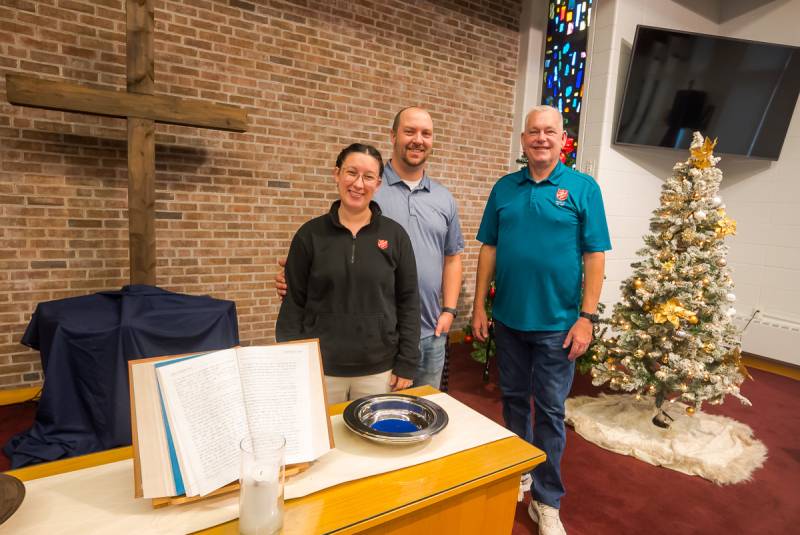
Photo by Howard Owens.
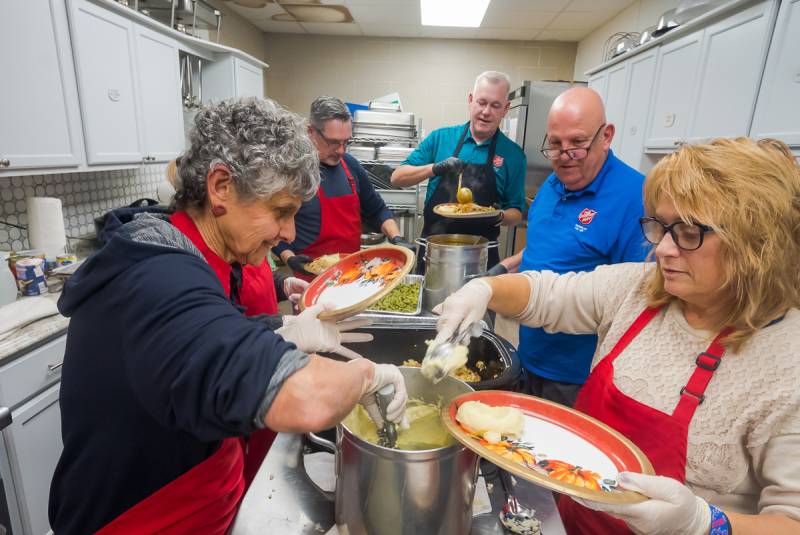
Photo by Howard Owens.
